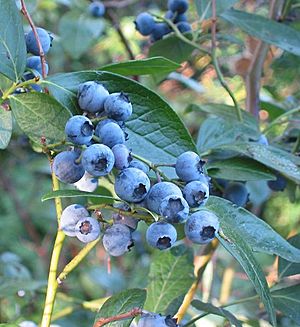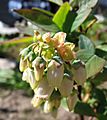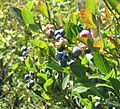Northern highbush blueberry facts for kids
Quick facts for kids Northern highbush blueberry |
|
|---|---|
 |
|
| Scientific classification | |
| Kingdom: | |
| (unranked): | |
| (unranked): | |
| (unranked): | |
| Order: | |
| Family: | |
| Genus: | |
| Species: |
V. corymbosum
|
| Binomial name | |
| Vaccinium corymbosum L. 1753
|
|
| Synonyms | |
|
|
The Northern highbush blueberry (scientific name: Vaccinium corymbosum) is a type of blueberry plant. It's very important because its berries are a popular food crop around the world. This plant originally comes from eastern Canada and the eastern and southern parts of the United States. You can find it from Ontario all the way to Nova Scotia, and south to Florida and eastern Texas.
It also grows naturally in other places like Europe, Japan, and New Zealand. People sometimes call it the 'blue huckleberry' or 'swamp blueberry'.
Contents
About the Northern Highbush Blueberry Plant
The Northern highbush blueberry is a deciduous shrub. This means it's a bushy plant that loses its leaves every autumn. It can grow quite tall, usually between 6 to 12 feet (about 1.8 to 3.7 meters) high and wide. You often find these plants growing close together in thick groups.
The leaves are dark green and shiny. They are shaped like an oval and can be up to 2 inches (5 cm) long. In the autumn, these leaves change into beautiful shades of red, orange, yellow, or purple.
Flowers and Fruit
The plant's flowers look like small bells or urns. They are white or very light pink and about 1/3 of an inch (8 mm) long.
The fruit is a round, blue-black berry. Each berry is about 1/4 to 1/2 inch (6 to 13 mm) across. These plants grow best in forests or open areas where the soil is moist and acidic.
The Northern highbush blueberry needs another plant to help it make fruit. It cannot pollinate itself. Most types of these blueberries also need a long period of cold weather to grow well.
History of Blueberries
People believe that many wild types of Vaccinium plants, including blueberries, were grown by Native Americans for thousands of years. There is proof from old sites that they even used to burn parts of the land on purpose to help these crops grow.
V. corymbosum was likely one of the species used by these early peoples. Later, in 1908, a scientist named Frederick Vernon Coville started to study and grow this plant more carefully. This led to the blueberries we know today.
How Blueberries Are Used
In their natural homes, blueberry berries are a food source for many animals. Birds, bears, and small mammals love to eat them. Deer and rabbits also eat the leaves of the plant.
The berries were an important part of Native American cuisine in areas where Vaccinium corymbosum grew naturally.
Growing Blueberries for People
Vaccinium corymbosum is the most common type of blueberry grown for sale in North America today.
People also grow it in their homes as an ornamental plant. It looks nice in gardens and helps attract wildlife. For the plant to grow well, the soil must be very acidic, with a pH between 4.5 and 5.5.
Popular Blueberry Types
Here are some common types of Northern highbush blueberries that farmers grow. They are grouped by when their berries are ready to pick:
|
|
|
Two of these types, 'Duke' and 'Spartan', have won a special award called the Royal Horticultural Society's Award of Garden Merit. This award means they are excellent plants for gardens.
Southern Highbush Blueberries
Some types of Southern highbush blueberry are hybrid plants. This means they are a mix of V. corymbosum and another blueberry plant called Vaccinium darrowii. V. darrowii grows naturally in the southeastern United States.
These hybrid blueberries were created to grow well in warmer parts of North America.
Gallery
See also
 In Spanish: Arándano azul para niños
In Spanish: Arándano azul para niños









